Three helicopters swoop menacingly into view, black-clad figures standing on the skids. As the TV news crews swing their cameras around, the choppers hover over the large embassy building while the men rappel swiftly onto the roof. Those same men descend the building’s face a moment later. Grenades blow out windows and the men disappear inside. Gunshots and more explosions follow.
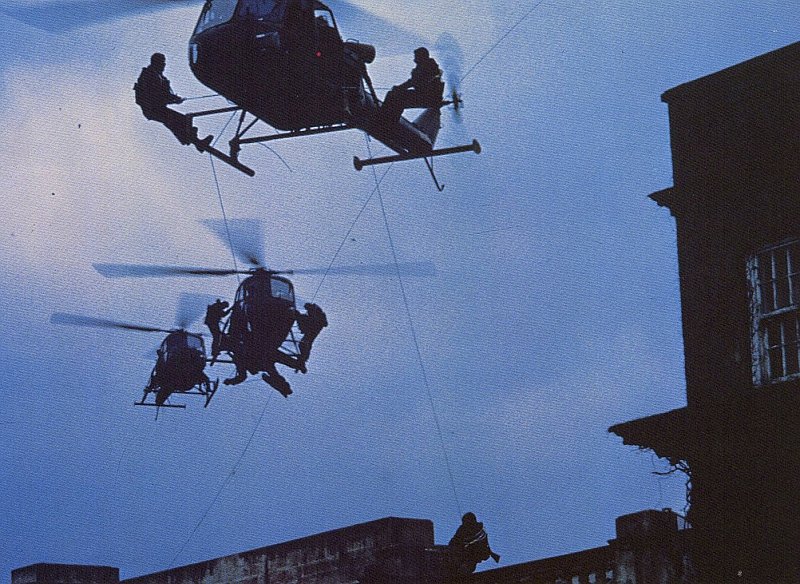
Emulating a Real Raid
Thus begins the climactic scene of 1982’s Who Dares Wins, which was marketed in the United States as The Final Option. “Who Dares Wins” is the motto of the elite British Special Air Service Regiment. The movie is loosely based on the 1980 terrorist takeover of the Iranian Embassy in London. The bad guys took hostages and killed several before the SAS stormed the building, ending the ordeal.
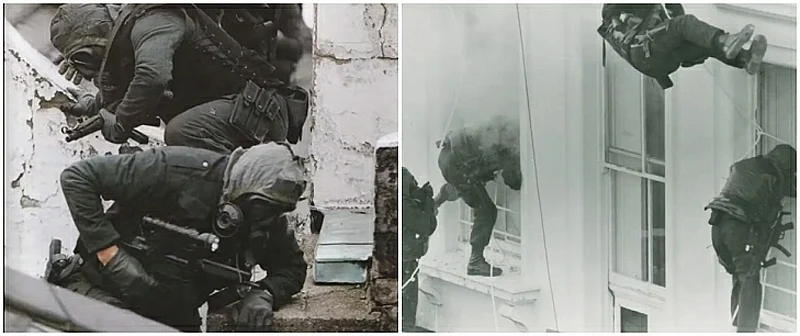
Producer Euan Lloyd lived only half a block from the embassy and watched the SAS troopers go in. You can watch footage of the incident on YouTube. Lloyd moved quickly to make a movie out of it.
The SAS Gets on Board
Surprisingly, the British Ministry of Defense and the SAS themselves cooperated after imposing a couple of requirements about revealing SAS methods and tactics. The MoD even provided the Westland Scout helicopters and crews used in the movie. The film crew and actors were granted limited access to the SAS base at Hereford, and some of the actors were trained by SAS trooper Alan White. Several SAS men served as technical advisors.
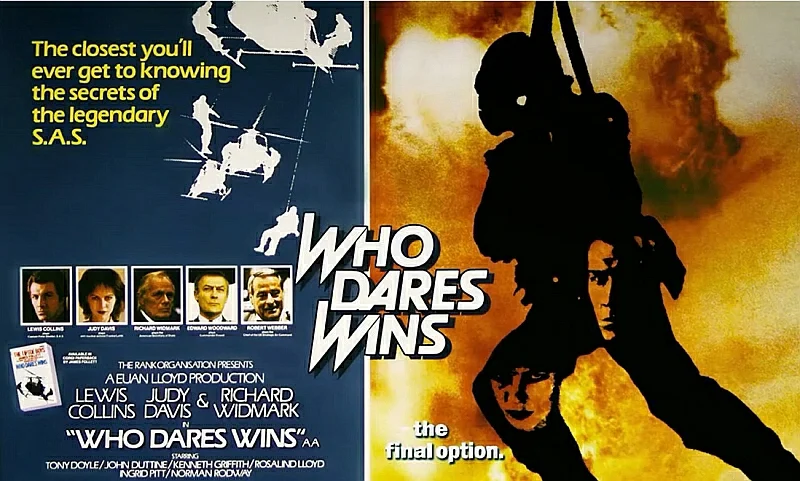
Lewis Collins was the perfect lead as SAS Captain Peter Skellen. Collins had passed the notoriously brutal SAS selection course but was not accepted for service. He had previously appeared in some television programs and the Regiment felt his face was too well known. That was a legit concern in 1982 since the SAS was still operating clandestinely in Northern Ireland. The IRA called them “Sass Men.” Collins does a really good job. On a side note, he was briefly considered for the role of James Bond about this time.
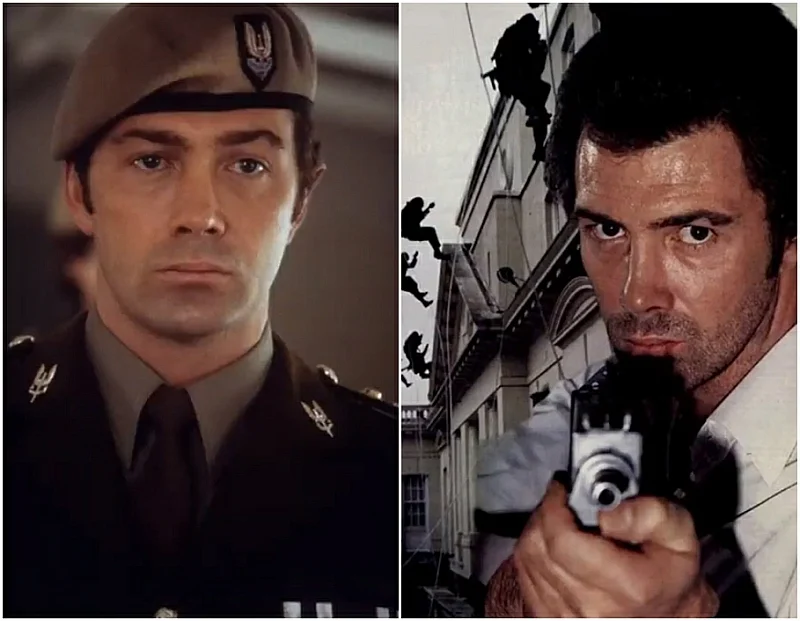
Actors and stunt men trained to perform the embassy assault described in the opening paragraph, but in the end, the SAS offered to do it themselves to provide greater realism. Lloyd and director Ian Sharp jumped at the chance because they knew they couldn’t fully replicate it. So, the guys doing the rappelling are real SAS men, adding authenticity to the movie.
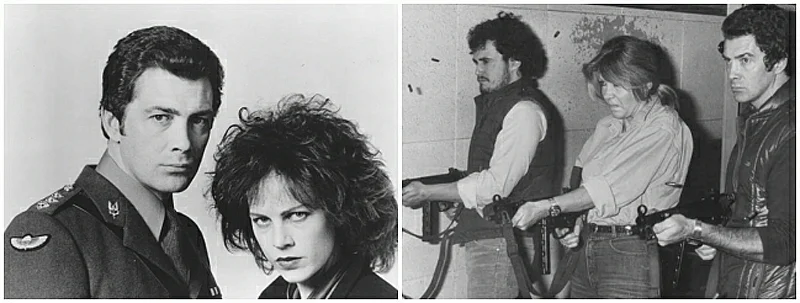
The clearing scenes inside the building are performed by actors. One trooper’s clothing catches fire as he enters through a blown-out window. Lloyd talked to a SAS guy to whom that happened at the Iranian Embassy assault in 1980, so he included it in the film.
A Renegade SAS Captain and a Lovely Terrorist
I don’t want to give away too much of the plot, despite Who Dares Wins being forty years old. Not many Americans have seen it. It was available years ago on VHS but was never released in the US DVD format. You can get it on Blu-Ray, but I hear it’s the censored TV version. No one wants to see that. Happily, it’s available to rent or buy on Amazon Prime Video, Apple TV+, and Tubi. So, you may want to give it a watch.
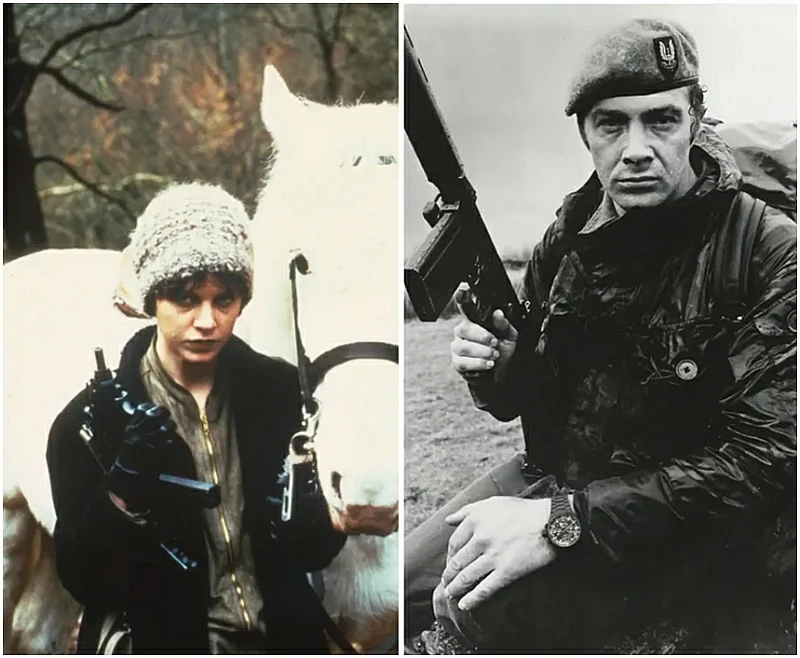
Anyway, the story revolves around Skellen being booted from the SAS for abusing two exchange officers training with his team. The two officers, an American Ranger and a German GSG-9 operator are portrayed in a poor light. They’re out of shape and barely proficient. I thought it was inaccurate when I saw the movie in its brief American cinema run and I still think so. But it’s a plot device that furthers the story.
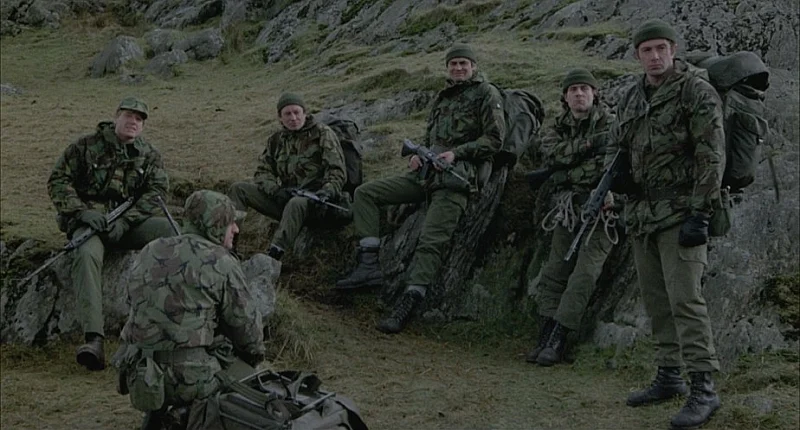
There was a big anti-nuclear protest movement in the 1970s and 80s. Massive marches took place all over the West, especially in Europe. Some of the protest organizations were very radical. Skellen begins frequenting their events, where he soon meets Frankie Leith (Judy Davis), an American idealist who leads the People’s Lobby anti-nuclear group. It turns out she’s planning something big.
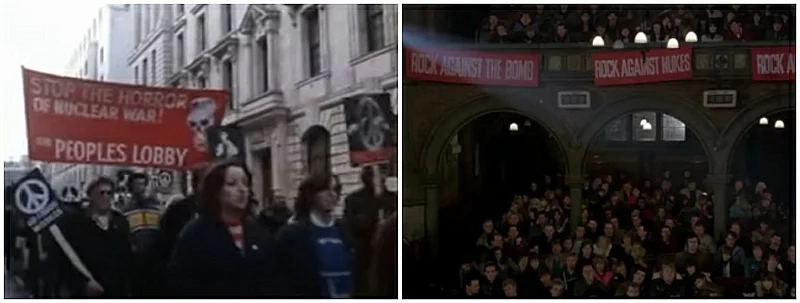
Skellen gets close to Frankie, who sees the value of having someone around who knows British counter-terrorism policy and tactics. We soon learn that Skellen is passing information on her and the People’s Lobby to the British government. His being kicked out is part of his cover. Frankie uses her contacts to confirm Skellen’s story, though she and her pals never quite trust him.
The movie winds through Frankie’s plot, culminating with the People’s Lobby taking over the American Ambassador’s residence while he’s throwing a fancy dinner party. The guests include the US Secretary of State, ably played by Richard Widmark, and the commander of the US Strategic Air Command.
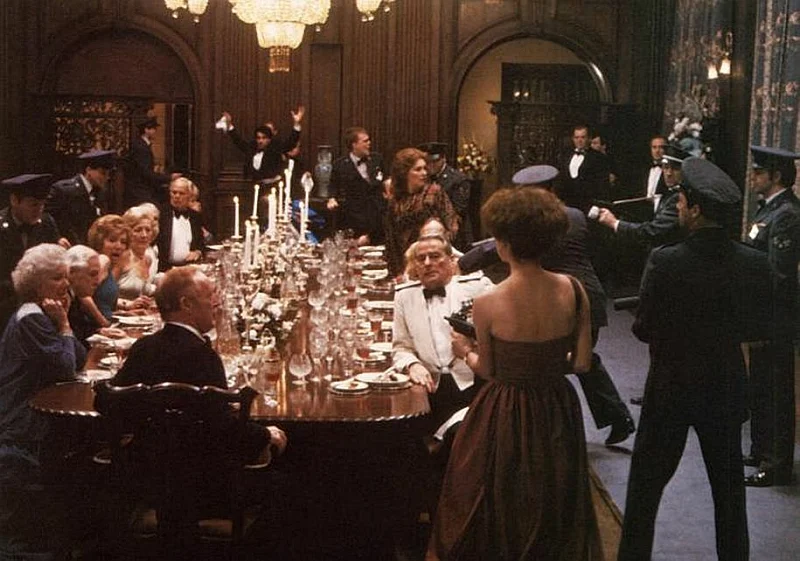
Frankie has also been digging further into Skellen’s past, discovering he has a wife and child in London. She dispatches two of her terrorist minions to hold them hostage against Skellen’s continued cooperation.
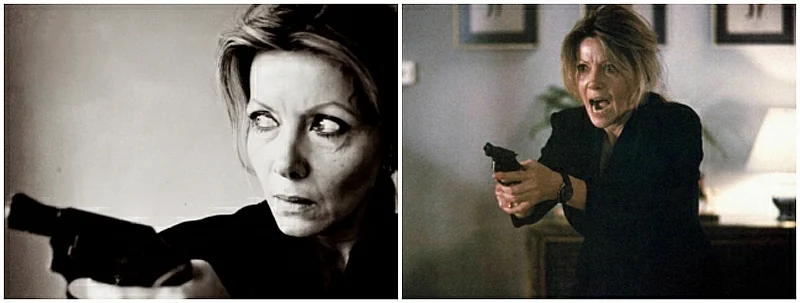
Ingrid Pitt plays an especially vicious terrorist named Helga, who tries to kill Skellen’s wife. That sets the stage for an epic SAS rescue. Pitt was also in the excellent Where Eagles Dare.
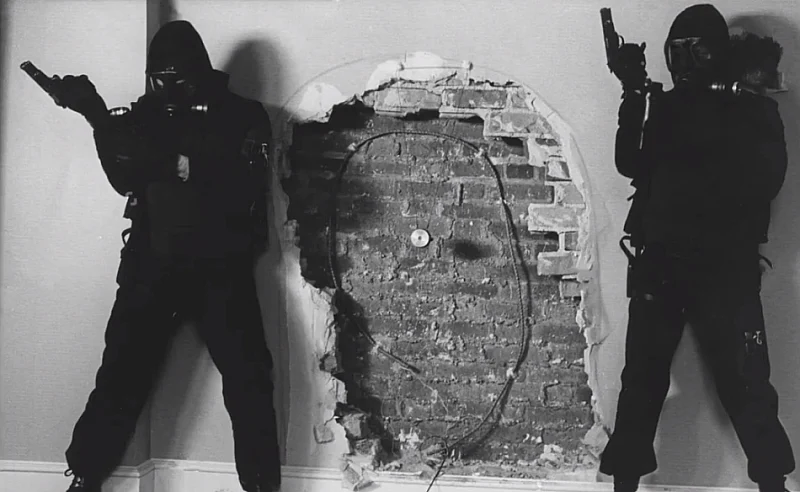
Frankie soon issues her demand that the British government destroys their submarine base at Holy Loch, on Scotland’s west coast, with a nuclear weapon. She says the point is to show the world the horrors of a modern nuclear detonation. She believes the people will then demand disarmament across the world. Of course, the Brits are never going to do that. Negotiations eventually break down and the SAS goes in to sort it out. The final option, as it were. Skellen assists from the inside in an intense ten-minute assault scene.
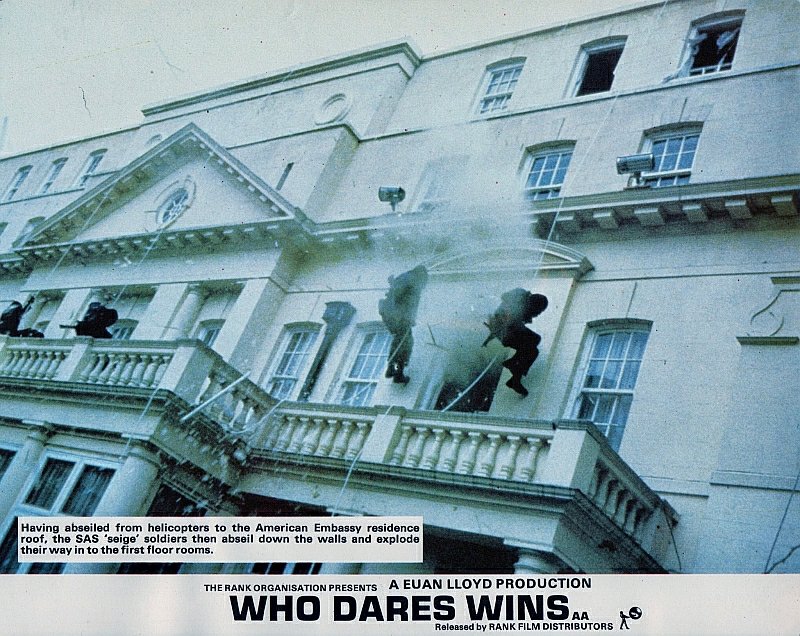
All the Cool Guns
The movie features several iconic firearms. The SAS guys use Browning Hi-Power pistols and HK MP5A3 submachine guns. Who Dares Wins is believed to mark the first widespread use of the MP5 in a movie.
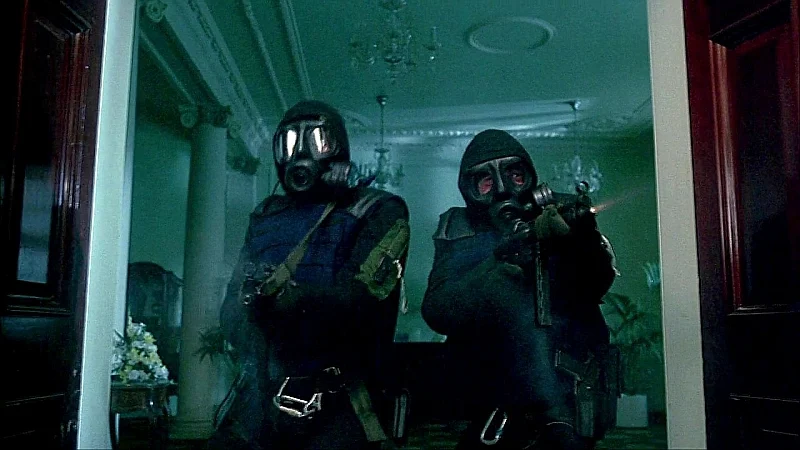
The troopers also use a 12-gauge Remington 870 Police Folder to breach the building’s front door. Skellen’s SAS team carries the British L1A1 SLR early in the movie.
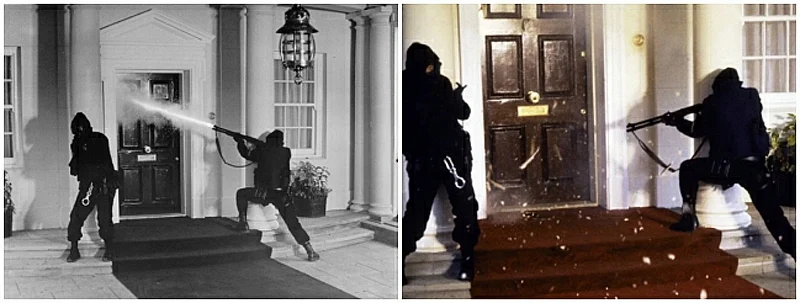
Federal M201-Z 37mm Riot Guns to blow out a couple of windows. This last is inaccurate. The SAS did use the M201-Z, but it only fires tear gas or baton rounds. The windows actually explode. But it looks cool, especially the delivery.
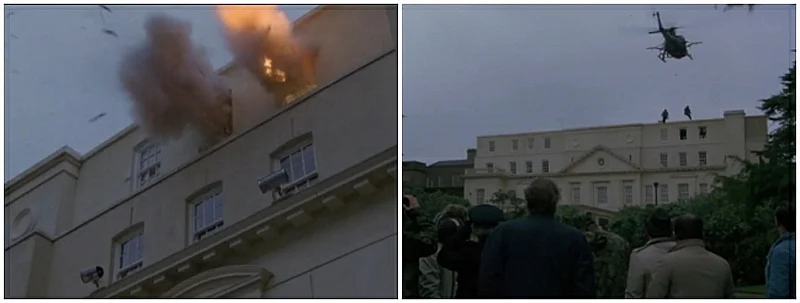
The troopers do use Schermuly training grenades to clear the building, as did the SAS at the time. Turns out they worked marvelously as stun grenades.
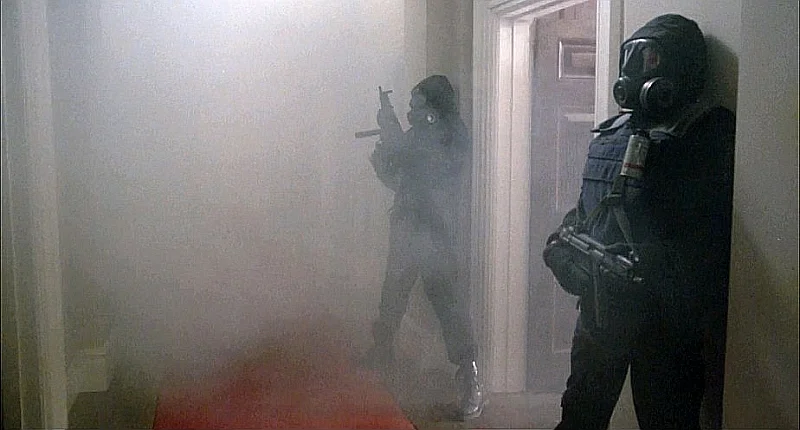
The terrorists carry 9mm Beretta PM12S submachine guns and Ingram MAC 10 machine pistols. A couple of the latter sport Sionics two-stage suppressors. A couple of the terrorists carry suppressed FEG Tokagypt Type 58 pistols, a Hungarian export version of the venerable Tokarev TT-33. And Helga rocks a Smith & Wesson Model 10 snubbie in .38 Special.
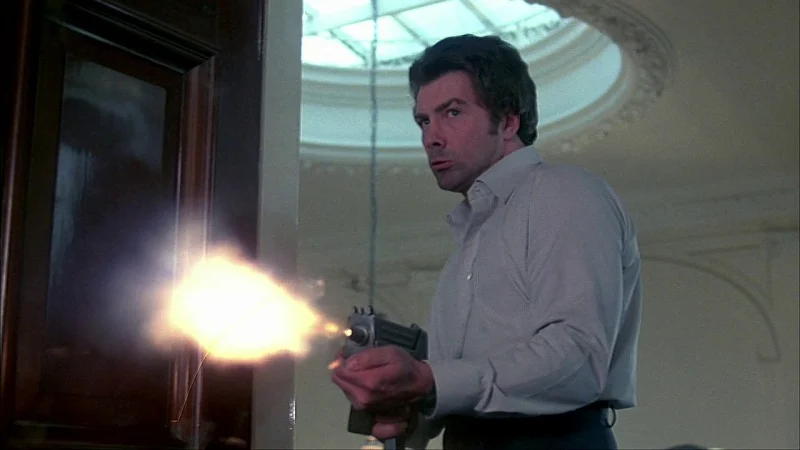
Other Coolness
Who Dares Wins shows some interesting SAS training scenes, apparently filmed at Hereford. We see the troopers simulating urban combat firing on the range, a train car assault, and a shoot house with Skellen playing the hostage. I don’t know whether those shooters were actors or real SAS guys. I think it’s probably a mix, depending on whether you can see their faces.
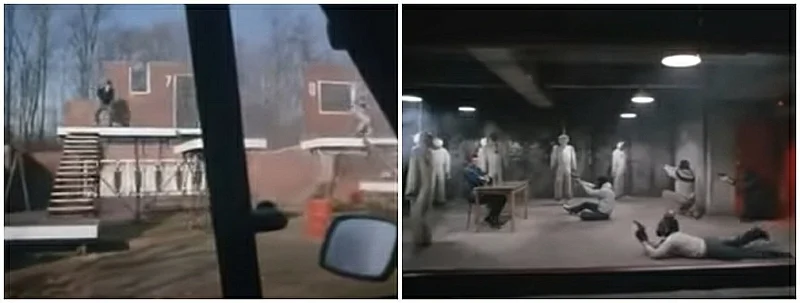
Mixed Reception, but Ronald Reagan and Stanley Kubrick Liked It
Who Dares Wins was popular in the United Kingdom, where it was 1982’s sixth highest-grossing movie. Princess Diana attended the London premier. Legendary director Stanley Kubrick personally called to tell Lloyd how much he enjoyed it.
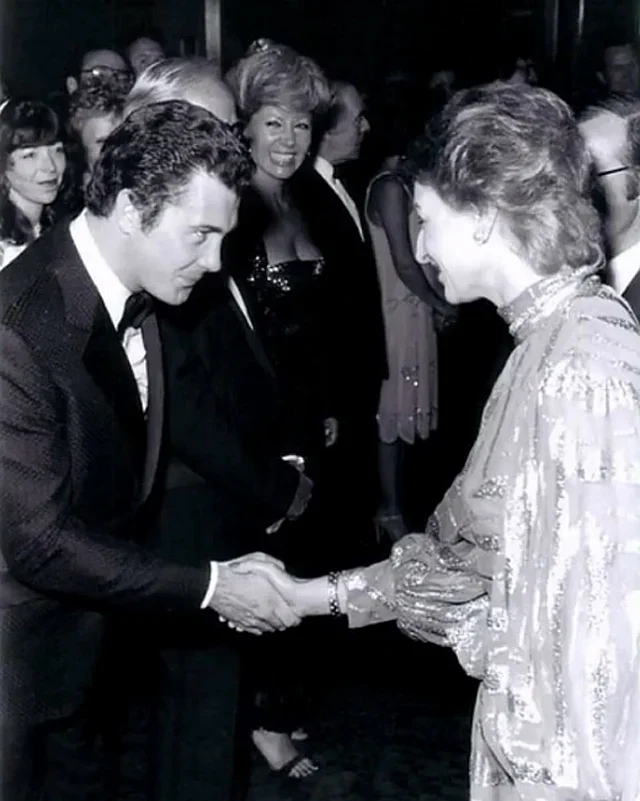
President Ronald Reagan requested a copy to screen at Camp David. He reportedly liked it, as did Secretary of State Alexander Haig, who had recently joined the board of MGM/United Artists. Haig convinced them to bring the movie to the US in 1983. The studio renamed it The Final Option.
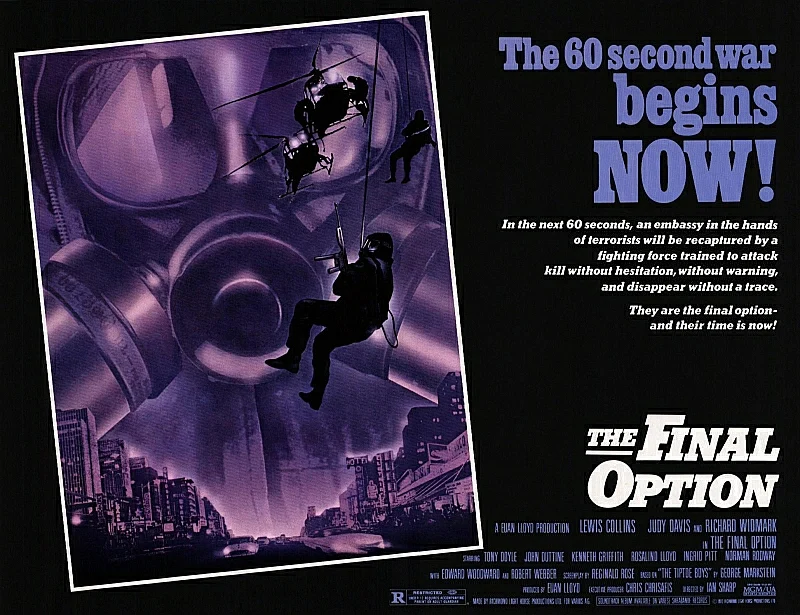
The movie didn’t do so well in America. It wasn’t properly advertised or supported, and film critic Roger Ebert panned it in The Chicago Sun Times. Ebert complained that the audience knew more about terrorist operations than the movie terrorists themselves. Could be, but to be fair, the People’s Lobby’s activist financier calls them “amateurs” before walking off arm in arm with a sympathetic Member of Parliament. I think that the last image is all too accurate sometimes.
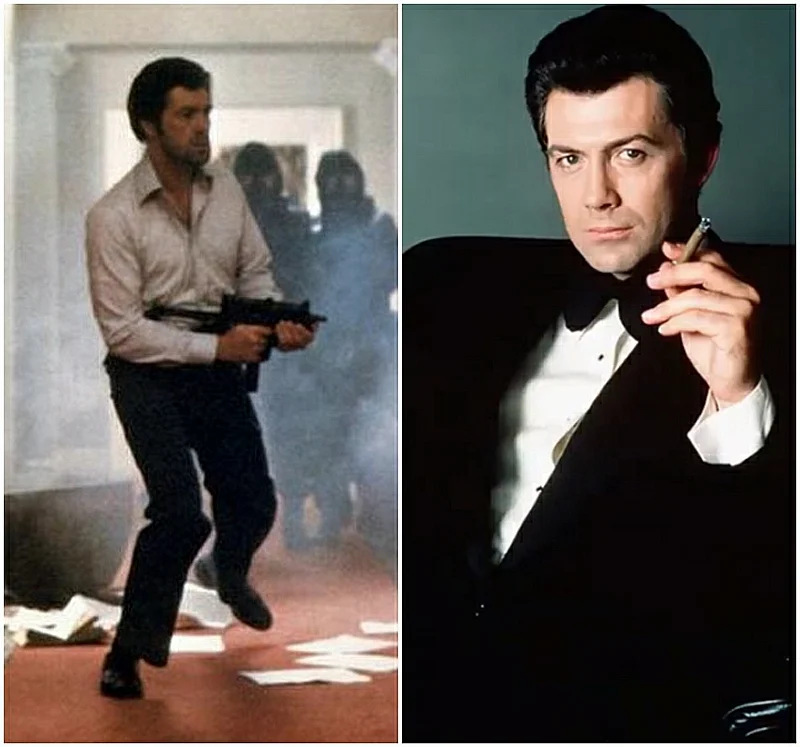
I saw The Final Option by accident. Some friends and I walked into a multiplex cinema in Tuscaloosa, Alabama, and saw the poster. We were freshmen at a military school and we thought it looked cool. Good decision. We loved it.

Maybe you will too. Who Dares Wins is a little cheesy sometimes, as older movies often are. But I think the action scenes hold up pretty well and it does capture a bit of the Cold War flavor of the early 1980s when the Evil Empire still loomed beyond the Iron Curtain.
Read more like this in the GunMag Warehouse series Saturday Night at the Movies.
